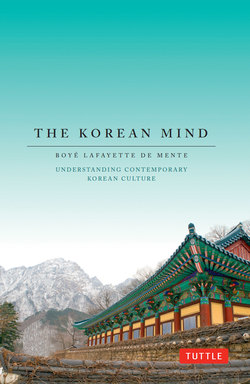Читать книгу The Korean Mind - Boye Lafayette De Mente - Страница 9
На сайте Литреса книга снята с продажи.
ОглавлениеUnderstanding and Interacting with Koreans
Koreans share many cultural characteristics with the Chinese and Japanese because of their geographic proximity, long history of contact, and the mutual influence of animism, shamanism, Buddhism, Confucianism, and Taoism. China was, in fact, the primary wellspring of Korean civilization from around 108 B.C. until modern times. But the Korean people have retained a unique character and personality that sets them apart from the Chinese and Japanese as well as other Asians—a difference that derives from their deepest spiritual and philosophical beliefs and from an image of themselves that has been shaped by both internal and external factors over the centuries.
A significant part of the Korean character was obviously forged by the rugged mountainous terrain of the country and by a climate that runs to the extremes of hot and cold. Another part of the character of Koreans was wrought in the bloody crucible of ongoing battles with raiders and invaders from the north and from the sea. Whatever the individual factors that went into the makeup of the Korean character and personality—and there were many others—the end result was a formidable people who have yet to achieve the full promise of their potential and from whom the world will hear a great deal more.
Contemporary Korean scholars and observers, including Dr. Jae Un Kim, a developmental psychologist and the author of several books on the Korean mind-set and behavior, have noted a variety of surface changes in the attitudes and behavior of Koreans since the end of the nineteenth century, but they say that the national character of Koreans has remained essentially the same.
As is the case with all ancient cultures created within highly refined and meticulously structured social systems over thousands of years, one of the keys to understanding traditional Korean attitudes and behavior is the language of the people—or, more precisely, key words in the language. These key words provide access to the Korean mind—to core concepts and emotions, the attitudes and feelings that make up the Korean psyche. These key terms reveal both the heart and soul of Koreans and provide bridges for communicating and interacting with Koreans on the most fundamental level.
I have selected more than two hundred of the most culture-laden words in the Korean language and attempted to explain their special role in history and in Korean life today in a way that is both meaningful and useful.
Boyé Lafayette De Mente
Seoul, Korea
